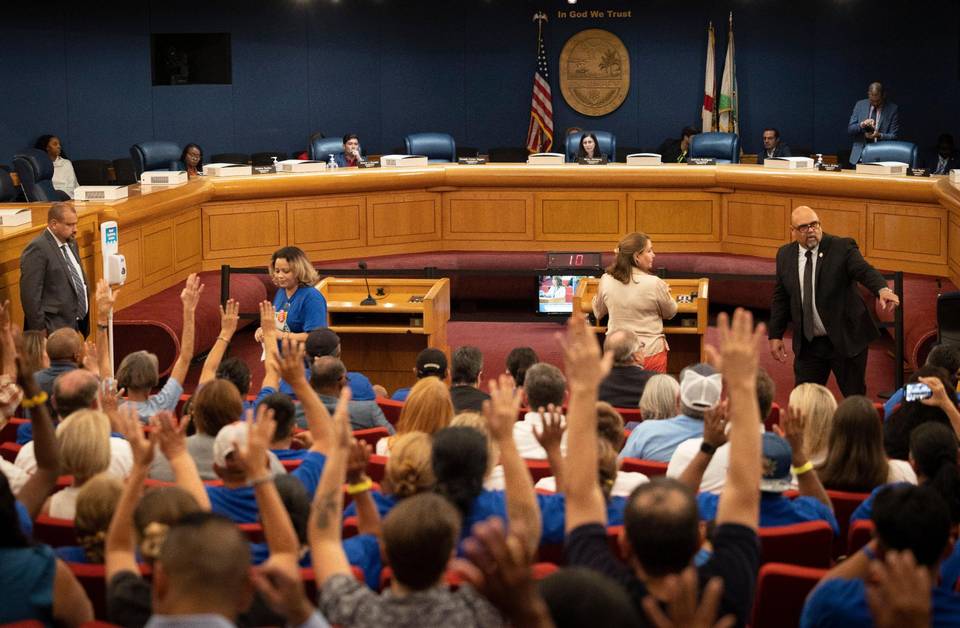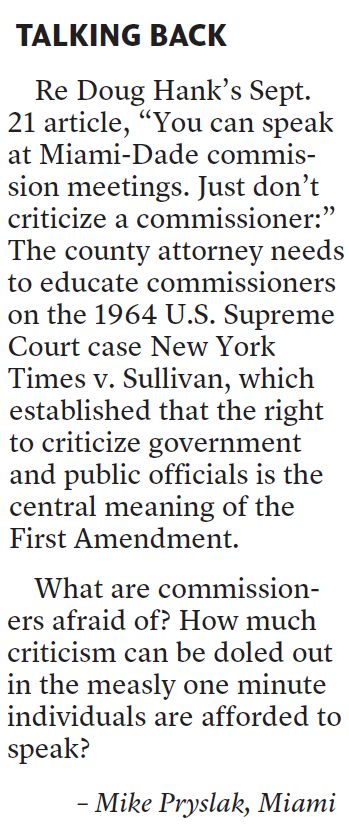Source: Doug Hanks’ September 22, 2023 story in the Miami Herald, originally published online September 21st:
You can speak at Miami-Dade commission meetings. Just don’t criticize a commissioner
Chairman Gilbert criticizes Pets’ Trust supporter for referencing the Mayor.
At the Sept. 7, 2023 budget hearing before the Miami-Dade County Commission, Kendall resident Sharon Shaw criticized Mayor Daniella Levine Cava by name in her remarks. That prompted a reminder from Oliver Gilbert, chair of the County Commission, of board rules prohibiting public speakers from mentioning individuals in their comments. By MiamiDade.Gov
When Miami-Dade County commissioners invite comments from the public, there’s one category of speech that’s officially prohibited: criticizing elected officials by name.
“I forgot to go through all the rules,” Oliver Gilbert, chair of the County Commission, told a packed chambers on Sept. 7 after a speaker criticized Mayor Daniella Levine Cava for a perceived misjudgment on policy toward homeless dogs and cats. “We act as a county. So we don’t direct comments to specific individuals.”
It’s a regular reminder by Gilbert and his predecessors running meetings at the Stephen P. Clark Center, where members of the public have a legal right to speak on agenda items but face local restrictions on who they can mention in those comments.
“I’m going to ask you guys for the last time,” Jose “Pepe” Diaz, the future Sweetwater mayor, told a feisty chambers audience during a Jan. 20, 2022 hearing on a Palmetto Bay bridge when he was county chair. “Do not single out an individual commissioner”
No applause is allowed in the Miami-Dade County Commission chambers, so members of the public typically waive their hands in support and flash thumbs-down signals when they disapprove of comments. No applause is allowed in the Miami-Dade County Commission chambers, so members of the public typically waive their hands in support and flash thumbs-down signals when they disapprove of comments. Alie Skowronski askowronski@miamiherald.com
While the Miami-Dade decorum policy hasn’t been challenged in court, lawsuits in Florida and beyond have left similar rules in place.
A federal judge in February ruled for the Brevard County School Board after the Moms For Liberty advocacy group sued because members kept getting interrupted when singling out board members at meetings. In 2021, a federal judge ruled for Marco Island in a challenge to the local government’s practice preventing public speakers singling out council members by name.
“Courts have struggled with this,” said Thomas Julin, a partner with Miami’s Gunster law firm who specializes in First Amendment cases. “The U.S. Supreme Court has not issued a definitive ruling on: here’s how you should implement a policy that’s trying to control the decorum of the meeting.”
Rules against naming elected officials are common throughout South Florida government. Miami-Dade’s school board enforces a similar policy. In July, police escorted former Surfside mayor Charles Burkett out of the Town Commission chambers for what his successor, Mayor Shlomo Danzinger, said was repeated violations of the rules against addressing individual board members.
Here’s a recent example
At the Sept. 7 budget hearing, Sharon Shaw’s denunciation of Levine Cava prompted Gilbert’s public reminder of the decorum rules that have been part of the county code for at least a decade. She carpooled from Kendall to the Clark Center that day, arriving for a 3 p.m. rally supporting more Animal Services spending and wearing the red T-shirt the Pets Trust group adopted as their uniform that day.
Shaw was in her seat well before the hearing started shortly after 5 p.m., and heard her name called at 5:53 p.m. for a 60-second chance to address the board and Levine Cava, who has a seat at the dais.
“Behind the rosy picture painted by Mayor Cava regarding the treatment of animals at Miami-Dade’s shelter lies a dismal reality,” Shaw said. “If the mayor believes that Miami-Dade County’s animals are being well treated under her watch, think again. We will in 2024 at the ballot box.”
Gilbert let her finish, so Shaw delivered her mayoral critique without interruption. She said she didn’t pick up that Gilbert’s comments were directed to her remarks, as she was giving her name to a reporter immediately after taking her seat.
“I would call that undemocratic,” Shaw said of the rule barring speakers from mentioning county office holders in County Hall. “To me, this is the forum to air something like that, as long one uses decent language and doesn’t accuse anyone of criminal activity. Criticizing that, to me, is in itself out of line.”
In a brief interview, Gilbert said the rules are in place to keep commission meetings orderly and not devolve into personal attacks against elected officials.
“It’s not just about criticism,” he said. “It’s a matter of decorum.”
Is this a free-speech issue?
For free-speech advocates, policies like Miami-Dade’s tread on residents’ constitutional rights to petition their government. They also see the restrictions as bad government by shielding elected office holders from hearing criticism from residents who took the time to get themselves to a county microphone to participate in the legislative process.
“You have the right to say: ‘This piece of legislation was submitted by Council Member X, and Council Member X has a conflict of interest,’ ” said Alan Gura, an Institute for Free Speech lawyer representing Moms For Liberty, the Florida-based advocacy group urging schools to ban books that violate a state law that restricts when some students can read about homosexuality and transgender adults. “You’re engaging in a conversation not just with the board, but you’re part of the public debate.”
Clay Calvert, a University of Florida law professor who specializes in free-speech issues, noted that some courts have ruled against governments limiting what residents can say at meetings. Others haven’t, resulting in what he calls a “mixed bag” of decisions to guide local governments.
One famous case in South Florida didn’t resolve the matter.
Supreme Court hears South Florida case
In 2018, the U.S. Supreme Court ruled with part-time Riviera Beach resident Fane Lozman in his suit against the city over his arrest after refusing to stop talking for violating the City Council’s decorum rules.
But the decision centered more on the narrow legality of the arrest than the broader issue of free-speech rules, according to a summary Calvert co-wrote in 2018 for the Case Western Law Review.
Still, Calvert calls the rules like Miami-Dade’s misguided even if they might survive a court challenge.
“If a citizen has a gripe about a specific public official, then why shouldn’t they able to identify them by name?” Calvert asked. “When you’re an elected official, you have to have thick skin.”
This story was originally published September 21, 2023, 3:37 PM.
Douglas Hanks 305-376-3605
Doug Hanks covers Miami-Dade government for the Herald. He’s worked at the paper for nearly 20 years, covering real estate, tourism and the economy before joining the Metro desk in 2014.
Here’s a September 27, 2023 letter published in the Miami Herald regarding the BCC’s policy on decorum rules trumping First Amendment rights.


